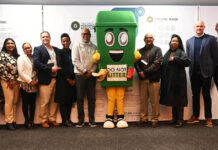THE Energy and Water Sector Education and Training Authority (EWSETA) recently hosted an insightful webinar titled Skills for a Water-Wise Future: Blending Innovation with Indigenous Wisdom.
Moderated by Hilton Bartman, CEO of All Core Water, the event convened experts and thought leaders to explore sustainable water management solutions for Sub-Saharan Africa.
The distinguished panel included Sylvain Usher, executive director of the African Water and Sanitation Association (AWSA), who offered insights into continental strategies for advancing water and sanitation access through a fusion of traditional and modern approaches. Adding to the government’s perspective, Petunia Ramunenyiwa, chief director for sector transformation and provincial governance in the Department of Water and Sanitation (DWS), discussed intergovernmental collaboration and policies necessary for fostering sustainable water solutions.
Providing an academic and economic lens, Professor Bongani Ncube, SARChI Chair in Governance and Economics of Water and Sanitation Sector Institutions and Acting Director of the Centre for Water and Sanitation, stressed the importance of robust economic and governance frameworks in supporting long-term water sustainability.
From a research perspective, Rhulani Shingwenyana, a Senior Researcher at the CSIR specialising in Water and Wastewater Treatment and Technology Development, highlighted advancements in membrane processes and wastewater treatment as pivotal to enhancing water resilience across Africa.
Central to the discussion was the urgent need for reliable water access in rural communities. Bartman emphasised the value of blending indigenous knowledge with cutting-edge technology, noting that only 24% of Sub-Saharan Africa has daily access to clean drinking water.
He argued that embedding African indigenous practices into national water management frameworks could offer sustainable solutions to the continent’s water challenges.
EWSETA’s CEO, Mpho Mookapele, in her keynote address, emphasised the SETA’s commitment to uniting indigenous wisdom with innovative approaches in its educational and public programmes.
“As stewards of this vital resource, we cannot ignore the value of indigenous knowledge. Preserving and applying this wisdom is essential to our future,”
Mookapele, stated, calling on stakeholders to support programmes that integrate these perspectives into practical solutions for water management.
Furthermore, Mookapele, reiterated EWSETA’s commitment to translating the discussions from this webinar into actionable programmes that blend Indigenous knowledge with technological advancement.
“We’re truly open to collaboration, and I want to extend a call to experts in the field: let’s work together to drive South African programmes, and African programmes, that can deliver tangible results.
She encouraged cross-sectoral partnerships to help realise sustainable water solutions across Africa, ensuring that future generations can thrive in a water-wise environment.
“By uniting our expertise, and involving the custodians of our indigenous knowledge systems, we can foster a transformative impact that resonates beyond borders and help conserve this scarce resource.”















